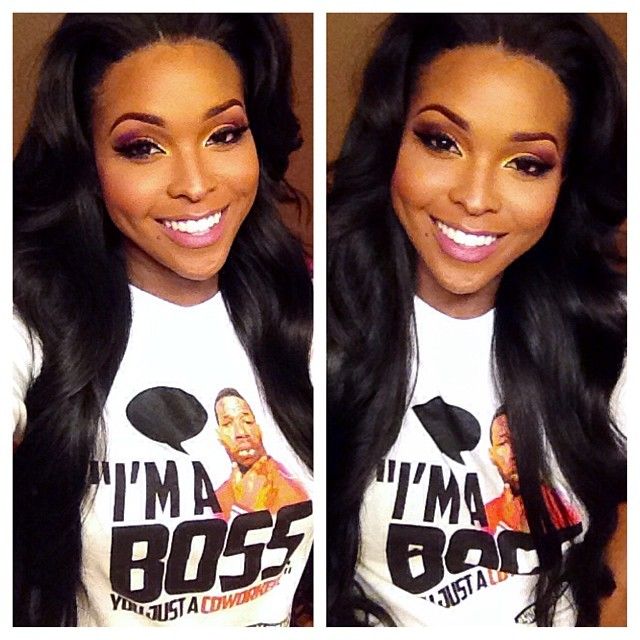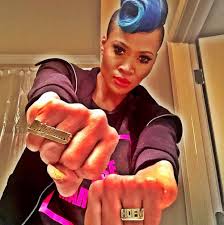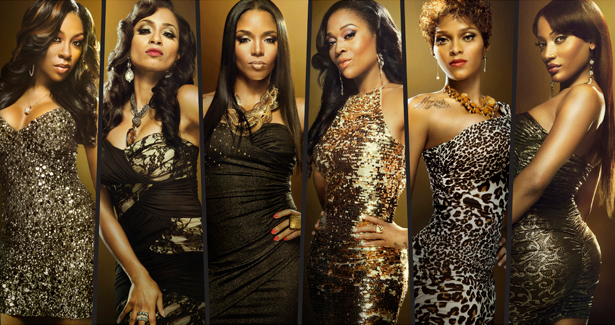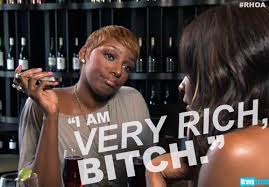In a recently published book chapter called, “Brains, Booty, and All Bizness”: Identity Politics, Ratchet Respectability, and The Real Housewives of Atlanta, I define ratchet respectability as “a hybrid characterization of hegemonic, racist, sexist, and classist notions of black womanhood,” which allows black women to combine ratchet behaviors (generally linked to race) to the politics of respectability (generally linked to class). I suggest that black women (particularly those represented on reality TV) are uniquely positioned to enact ratchet respectability through their negotiation of supposed authentic race and class behaviors. Because class based performances (from bourgeois to basic) do not exclusively refer to how much money you make, but rather how you act in public, performing class is as much a learned behavior as performing gender.
I argue in the chapter that the women on RHOA are forced to simultaneously perform “high class” and “low class” sensibilities, regularly referring to how much money they have (as per Nene’s famous line, “I’m rich, bitch”) while also keeping it real and holding it down like any other regular (read “realistic”) blackgirl from around the way.
Citing Crunktastic and Heidi Renee Lewis I concede that black women can use ratchetness to resist and challenge hegemonic norms and that most black women (or at least those I know, myself included) can be both ratchet and respectable (sometimes at the same time, sometimes situationally).
While I don’t go ‘round advertising it to everybody I have watched every episode of Love and Hip Hop Atlanta. Like RHOA, LHH responds to my curiosity and voyeuristic tendencies as both an ethnographic researcher and small town brown girl. I am fascinated (if not repelled by) the ways black women engage and present themselves through the guise of “reality,” and in the context and backdrop of the South. I engage and interact with ratchet reality shows because I recognize pieces of myself and people I know in the oftentimes cringe worthy made for TV moments of blackgirl shenanigans, shade and shamtastery.
I have observed the following five similarities between the LHH (which is predominantly black and brown folk) and the Real Housewives (which is predominantly white, other than the Atlanta based show) franchises, which I believe dictate the performative possibilities of ratchet respectability on the shows.
Age. The women on RHOA (as well as the franchise) are in their 30’s and 40’s (some older), and the women of LHH are in their 20’s and 30s’s (some older). Age becomes a factor in these shows as the women, in an attempt to defy age (through plastic surgery or excessive exercise) regularly attempt to shame each other about their ages (who is younger/older, who looks younger/older). In RHOA the cast members regularly comment on each other’s ages, even if they are only a few years older or younger, while younger women on LHH (namely Joseline and Kirk’s client Ashley Nicole this season) tease and taunt older women cast mates by making comments about their age (“old lady”). Consistent in the two shows is the cultural assumption that women are less desired and desirable as they get older.
Interestingly the age gap on screen does not have a significant influence on who is tuning in. While the target age of RHOA is 25-54, and 18-49 for LHH, it is erroneous to assume that teenagers who may aspire to be a housewife don’t binge watch Real Housewives marathons, or that women (of color) over a particular age lose interest in hip hop. Further, as has always been the case, black folk are faithful consumers of black popular culture, even when it is problematic (and so are other racial demographics, but that’s another blog for another day). Further, the shade and catfighting that is commonplace on both series is reminiscent of adolescent tantrums and mean girl feuds…but I digress.
Location. While both The Real Housewives and Love and Hip Hop franchises film in New York, LA/Hollywood, and Atlanta, the Atlanta based shows, for both series, are the most successful. Commonly referred to both as the “unofficial capital of black America,” and “the dirty South,” Atlanta is heralded as the place to be for the black glitterati and where black folk are doing the damn thing financially. Atlanta, Georgia is not only a mecca for black folk and other nondominant populations, it is also a space where (reality) stars are going to be born. Geographically and predominantly black, ATL combines Southern, country, city, and bourgeois identities in one, making it a place where real housewives can be black and real hip hop can be dirty.
Focus on (wo)men. Love and Hip Hop originated as a show about men in hip hop, which included their romantic relationships. Therefore, many of the women of LHH are generally on the show or introduced to the show because of their relationship to men, if not their relationship to hip hop which is characterized as a masculine and misogynistic genre that the women must both manipulate and navigate like men to be successful. RHOA, on the other hand, was imagined as a reality show that focused on women as “housewives,” and their significant others (and children) are usually secondary storylines to their relationships with one another. Over the years, however, LHH has adopted that formula and in true soap opera fashion centers the narratives of the women whose lives and storylines are centered around men and/in hip hop.
Heteronormativity. While RHOA was progressive from its first season with the inclusion of gay men on the show as confidantes to the housewives, the use of homophobic slurs and/or accusing former lovers of being gay in subsequent seasons reiterated heteronormativity and homophobia. Amiya Scott, a transwoman of color, will be joining the cast in the upcoming season which offers an opportunity for redemption on RHOA in terms of how cast members engage members of the LGBTQA+ community.

While the LHH franchise has prominently featured women who identify as lesbian or bisexual as primary cast members since its inception there has still been a centering of the male gaze and male desire, thereby fetishizing rather than normalizing their sexuality. LHH recently introduced a conflicted gay black rapper, Sir Brock, and his “rapper/producer/model” boyfriend Miles to the Hollywood storyline that promises to be a compelling narrative. Given the rampant homophobia in hip hop, particularly towards same gender loving men, it will be important to see an expansion of how black masculinity is imagined and performed as well as how heterosexual black men on the show respond to the openly gay relationship. While I applaud the representation of nonheterosexual folk of color, I am hoping for representations that offer narratives that do not hypersexualize, ostracize or reduce them to their sexual orientations.
Money, honey. While RHOA implies that the women, who are older, have had access to money for years (though, not generations), LHH casts represent “new” money, or the hustle for money. With few exceptions we don’t see them “working” for money but rather spending money. Money is an ongoing theme in both franchises, even when it is clear that they are pretending (to have) or perpetrating wealth. Further, the splurges on LHH are framed as ostentatious and frivolous while the splurges on RHOA are merely indulgences. This offers an additional layer and critique to the discussion of respectability politics for folk of color who participate in white culture with hegemonic and canonical narratives of success versus hip hop culture where hustling (“starting from the bottom”) is privileged and working class roots lead to the expression, expectation and embrace of ratchetness.
So yeah, while I believe the performance of ratchet respectability is consistent in both LHH and RHOA, how ratchet respectability is performed is based on age, geography, the role of hetero and homonormative romantic relationships, the role women play (as cast members, significant others, or recurring guests), and the real or imagined fortunes cast members have access to. In short, black women in reality TV continue to rely on their performance of stereotypes and mischaracterizations to be memorable and entertaining while their efforts at keeping it real (or ratchet) in the midst of misogynoir and classism remains to be seen.
Sponsored: https://www.sportstalkphilly.com/online-casinos/crypto



